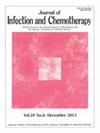延长脉冲非达霉素治疗标准万古霉素和非达霉素无效后复发性难治性梭菌感染1例
IF 1.9
4区 医学
Q3 INFECTIOUS DISEASES
引用次数: 0
摘要
艰难梭菌感染(CDI)是医疗保健相关腹泻的主要原因。在多次发作后,高达60%的患者会出现复发,这是一个重大的临床挑战。虽然万古霉素(VCM)和非达索霉素(FDX)是推荐的一线治疗方法,但治疗失败和复发并不罕见。延长脉冲非达索霉素(EPFX)已被建议用于减少复发,特别是在高危患者中,尽管对于多次复发的证据仍然有限。我们报告一例66岁晚期食管癌和胃癌患者,尽管接受了VCM和FDX的标准治疗,但仍经历了四次复发性CDI。鉴于bezlotoxumab (BEZ)在日本的不可获得性和粪便微生物群移植(FMT)的可及性有限,EPFX被选择作为补救方案。在解释EPFX和脉冲锥形口服VCM后,患者和医生选择开始使用EPFX,包括200 mg,每天两次,连续5天,然后每隔一天200 mg,连续20天。4个多月未观察到进一步复发,也没有注意到不良反应。尽管EXTEND试验排除了复发≥3次的患者,但该病例支持在具有多种高风险特征的患者中使用EPFX,包括高龄、活动性恶性肿瘤和既往治疗失败。FDX良好的药代动力学特性可能有助于其疗效。重要的是,患者的药物、营养和肿瘤状态在整个治疗过程中保持稳定,这表明EPFX在实现缓解中发挥了关键作用。EPFX可能为标准治疗难治性复发性CDI患者提供一个可行的选择。本文章由计算机程序翻译,如有差异,请以英文原文为准。
Extended-pulsed fidaxomicin therapy for recurrent Clostridioides difficile infection after standard vancomycin and fidaxomicin failure: A case report
Clostridioides difficile infection (CDI) is a leading cause of healthcare-associated diarrhea. Recurrence occurs in up to 60 % of patients following multiple episodes, posing a major clinical challenge. While vancomycin (VCM) and fidaxomicin (FDX) are recommended first-line therapies, treatment failures and recurrences are not uncommon. Extended-pulsed fidaxomicin (EPFX) has been proposed to reduce recurrence, especially in high-risk patients, though the evidence remains limited for those with multiple prior relapses. We report the case of a 66-year-old man with advanced esophageal and gastric cancer who experienced four episodes of recurrent CDI despite standard treatment with VCM and FDX. Given the unavailability of bezlotoxumab (BEZ) in Japan and the limited accessibility of fecal microbiota transplantation (FMT), EPFX was selected as a salvage regimen. After both EPFX and pulse-tapered oral VCM were explained, the patient and physician elected to initiate EPFX, consisting of 200 mg twice daily for five days followed by 200 mg every other day for 20 days. No further recurrences were observed for over four months, and no adverse effects were noted. This case supports the use of EPFX in patients with multiple high-risk features—including advanced age, active malignancy, and prior treatment failures—despite the EXTEND trial's exclusion of patients with ≥3 recurrences. The favorable pharmacokinetic properties of FDX may have contributed to its efficacy. Importantly, the patient's medication, nutritional, and oncologic status remained stable throughout treatment, suggesting that EPFX played a pivotal role in achieving remission. EPFX may offer a viable option for patients with recurrent CDI refractory to standard therapies.
求助全文
通过发布文献求助,成功后即可免费获取论文全文。
去求助
来源期刊

Journal of Infection and Chemotherapy
INFECTIOUS DISEASES-PHARMACOLOGY & PHARMACY
CiteScore
4.10
自引率
4.50%
发文量
303
审稿时长
47 days
期刊介绍:
The Journal of Infection and Chemotherapy (JIC) — official journal of the Japanese Society of Chemotherapy and The Japanese Association for Infectious Diseases — welcomes original papers, laboratory or clinical, as well as case reports, notes, committee reports, surveillance and guidelines from all parts of the world on all aspects of chemotherapy, covering the pathogenesis, diagnosis, treatment, and control of infection, including treatment with anticancer drugs. Experimental studies on animal models and pharmacokinetics, and reports on epidemiology and clinical trials are particularly welcome.
 求助内容:
求助内容: 应助结果提醒方式:
应助结果提醒方式:


